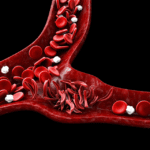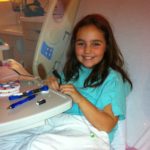How Do Parents and Surgeons Evaluate Treatment Options for Uncomplicated Appendicitis?
How Do Parents and Surgeons Evaluate Treatment Options for Uncomplicated Appendicitis? https://pediatricsnationwide.org/wp-content/uploads/2020/08/MCA-header-1024x575.jpg 1024 575 Natalie Wilson Natalie Wilson https://pediatricsnationwide.org/wp-content/uploads/2021/06/Natalieheadshot3-2.png- August 17, 2020
- Natalie Wilson

The most recent in a series of publications on management of uncomplicated appendicitis showed patients and families cited the same concerns when electing either surgery or nonoperative treatment.
Antibiotics alone have been shown to successfully treat uncomplicated appendicitis in children. But patients, families and surgeons may differently evaluate risks and benefits of this treatment option.
Peter Minneci, MD, and Katherine Deans, MD, co-founders and directors of the Center for Surgical Outcomes Research at Nationwide Children’s Hospital, have studied management of uncomplicated appendicitis — and how patients and families choose between surgical and nonoperative treatment options — for nearly 10 years, informed by a multidisciplinary “stakeholder group” that includes the perspectives of patients and families in study designs.
Through this effort, Drs. Minneci and Deans have conducted several studies, including a groundbreaking pilot study in 2015, published in JAMA Surgery, and a recent follow-up study, published in JAMA, which demonstrated the efficacy of nonoperative management of uncomplicated appendicitis in 10 health care systems across the Midwest. The patient-choice study also found that for those who elected nonoperative management, antibiotic treatment was associated with fewer disability days at one year for both patients and their caregivers, compared to urgent surgery.
Drs. Minneci and Deans say that it’s also important to understand the nuances of how families weigh the risks and benefits of these two very different treatment paradigms when making complex decisions for their child’s health. Another recent study the pair authored, initially published on June 7, 2019 in JAMA Network Open and re-examined in a recent research letter published in JAMA Pediatrics on Aug. 3, 2020, explored how shared decision-making may be facilitated through a better understanding of how the values of patients and their caregivers impact their treatment decisions. Two hundred patients were randomly assigned to either receive only standard surgical counseling from their provider or to additionally be provided with a patient activation tool: an interactive iPad app that provided information, encouragement and guidance on the shared decision-making processes.
The research letter, focusing on the group who had access to the patient activation tool, explained that the most important reasons patients and families gave when selecting either treatment option were actually the same — avoiding recurrence of appendicitis and risks of bleeding and infection — suggesting that different individual patients and families may receive, interpret and value the same information about risks, benefits and reoccurrence rates very differently.
Drs. Minneci and Deans found that there were no significant differences between participants who chose either treatment in terms of education or family income, but those who chose surgery were more likely to have been transferred from another institution and speak primarily English at home.
Understanding the nuances of the decision-making process that patients and their caregivers use to choose between surgery and nonoperative management also has implications for future research. The consensus for acceptable thresholds for both the success rate of nonoperative management and differences in disability days among the stakeholder group were both lower than those of the surgeons involved in the study. This difference is important because previous major trials prior to those conducted by this team may have been driven by surgeon expectations and therefore may have been biased against nonoperative management.
“If our goal is to improve the quality of life for families, then we need to ask families what they care about, and study those things,” says Dr. Deans. “In order to do this, we use stakeholder groups that are heavily weighted with patients and families to assist in designing our studies. This helps us better understand what is important to them, and it also gives families an active role in designing the research that may affect others with the same diseases.”
References:
- Minneci PC, Hade EM, Lawrence AE, Sebastiao YV, Saito JM, Maki GZ, Fox C, Hirschi RB, Gadepalli S, Helmrath MA, Kohler JE, Leys CM, Sato TT, Lal DR, Landman MP, Kabre R, Fallat ME, Cooper JN, Deans KJ for the Midwest Pediatric Surgery Consortium. Association of Nonoperative Management Using Antibiotic Therapy vs Laparoscopic Appendectomy With Treatment Success and Disability Day in Children With Uncomplicated Appendicitis. 2020 July 27 [Epub ahead of print].
- Minneci PC, Mahida JB, Lodwick, DL, Sulkowski JP, Nacion KM, Cooper JN, Ambeba, EJ, Moss RL, Deans KJ. The effectiveness of patient choice in non-operative versus surgical management of uncomplicated acute appendicitis.JAMA Surgery. 2016
- Minneci PC, Cooper JN, Leonhart K, Nacion K, Sulkowski J, Porter K, Wei L, Deans KJ. Effects of a patient activation tool on decision making between surgery and nonoperative management for pediatric appendicitis: a randomized clinical trial. JAMA Network Open. 2019 Jun 5 [Epub ahead of print].
Image credit: Adobe Stock
About the author
Natalie is a passionate and enthusiastic writer working to highlight the groundbreaking research of the incredible faculty and staff across Nationwide Children's Hospital and the Abigail Wexner Research Institute. Her work at Nationwide Children's marries her past interests and experiences with her passion for helping children thrive and a long-held scientific curiosity that dates back to competing in the Jefferson Lab Science Bowl in middle school. Natalie holds a bachelor’s degree in sociology from Wake Forest University, as well as minors in women's, gender & sexuality studies and interdisciplinary writing. As an undergraduate student, Natalie studied writing and journalism, engaged with anthropological and sociological research with a focus on race and ethnic relations, served as executive editor for the student newspaper, the Old Gold & Black, and gained marketing experience as an intern for a nonprofit entrepreneurial incubator, Winston Starts, as well as by working for Wake Forest University School of Law Office of Communication and Public Relations and its Innocence and Justice Clinic.
-
Natalie Wilsonhttps://pediatricsnationwide.org/author/natalie-wilson/
-
Natalie Wilsonhttps://pediatricsnationwide.org/author/natalie-wilson/
-
Natalie Wilsonhttps://pediatricsnationwide.org/author/natalie-wilson/
-
Natalie Wilsonhttps://pediatricsnationwide.org/author/natalie-wilson/September 1, 2020
- Posted In:
- Clinical Updates
- In Brief
- Research










